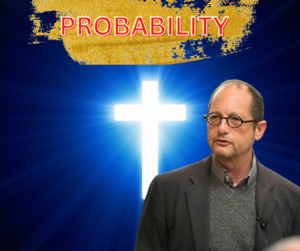In chapter 8 of my book Inference To The One True God, in my blog post “The Minimal Facts Case For Jesus’ Resurrection PART 1” and in my blog post “A Quick Case For Jesus’ Resurrection”, I make the case that we know many people had experiences of the risen Jesus appearing to them because the creed cited in 1 Corinthians 15 dates back so early, well within the lifetimes of the eyewitnesses (i.e it dates to 5 years after Jesus’ death), that anyone curious about whether or not Paul was telling the truth could have traveled over to Jerusalem and interviewed the people mentioned in the creed to see if they really did believe Jesus appeared to them. If Paul were lying about these people and they really hadn’t seen Jesus, the cat would have been out of the bag and the resurrection would have been exposed as a falsehood. Given how fragile a faux resurrection would be in this case, the best explanation is that the twelve disciples, James, and 500 people actually did have postmortem Jesus experiences.
On two different occasions, people have read my argument for the historicity of the postmortem appearances and have responded with the following rebuttal: “Paul is writing his letters to churches far removed in distance from where the events are said to have occurred. It would be highly unlikely anyone from his church in Corinth would travel to Israel and seek out these apparent witnesses.” The argument is that Jerusalem and Corinth were so far that it would have been very difficult for Paul’s readers to trek all the way over to Jerusalem in order to interview the people Paul was talking about. It was too inconvenient for them, so most probably never did it and never would have done it. So the they-could-have-checked-it-out argument fails. Is this true? Was Paul’s resurrection eyewitness list really protected from falsification due to large travel distance?
I don’t think this is a successful argument. There are 3 reasons why the resurrection claims could have been checked out.
1: The Corinthians Had An Invested Interest In Knowing If It Was True
The reason why Paul was even mentioning the list of resurrection appearances in 1 Corinthians 15 is because we see in the context of the passage that there were people denying that Christ had risen from the dead, implicitly at least, because they were denying the bodily resurrection in general. They were denying that anyone would rise from the dead. Paul said if the dead are not raised then Christ isn’t raised either if Christ isn’t raised, our faith is useless and our sins remain unatoned for (1 Corinthians 15:12-14), but fortunately, Christ has been raised (verse 20). Paul argued for this by listing the various postmortem appearances of Christ in verses 3-8 via the creed he had received earlier. Now, given that the Corinthians were skeptical of the resurrection, wouldn’t they have an invested interest in knowing whether Paul was telling the truth? Of course! And given that they had an invested interest, if they didn’t take Paul at his word, wouldn’t they have traveled to Jerusalem to talk to the people mentioned in the creed even if it was a rather long journey? While it might have indeed taken them a while to get there, it wasn’t impossible for them to arrive in Jerusalem. It’s not like they were traveling to New York or anything. It was certainly feasible for them to go to Jerusalem to interview the witnesses in the creed even if it wasn’t a hop, skip, and a jump from their church.
And given that this was a topic of immense interest to them, it would be difficult to argue that they wouldn’t have. Besides, we know that Paul traveled to Jerusalem to Corinth. Why wouldn’t the Corinthians travel from Corinth to Jerusalem?
2: The Resurrection Occurred During Festival Time
Moreover, the resurrection was during a festival time. The witnesses would have been from all over the place, seen the appearances, and gone back home. It’s very likely some of the 500 that Jesus appeared to were from the city of Corinth. It very well could have been the case that there were some Jewish eyewitnesses to the resurrection of Christ living in the very midst of Paul’s readers. In that case, the Corinthian resurrection doubters wouldn’t have had to travel very far at all. There were likely witnesses in their own back yard.
It was certainly the case that those reading Corinthians included Jews who may have traveled to Jerusalem for Passover. This would provide an opportunity to verify Paul’s assertion.
3: Mail From Snails
It is also the case that even if no one physically visited the twelve disciples and James, that they could have gotten verification via correspondence, i.e snail mail. The Corinthian resurrection doubters could have written letters to the disciples asking them “Hey yo, Pete mah BOIII! It’s ya boi Zechariah from Corinth. My homie Paul sent me a letter saying Jesus appeared to you after He died. This true, bro?” (first-century folks totally talked like this). And Peter, John, or whichever of the eyewitnesses received the letter, could have sent a reply saying either “He is risen! He is risen indeed!” or “What? Who told you this? I haven’t seen Jesus sent they crucified him.”
Conclusion
Given these 3 reasons, I think it is still the case that having the 1 Corinthians 15 creed dating within the lives of all the eyewitnesses provides good grounds for concluding that these postmortem sightings occurred. If they didn’t, the eyewitnesses could have talked to these people themselves, by either journeying over to Jerusalem despite it being a long journey, because they had a highly invested interest in knowing whether they occurred. Or they could have had postmortem witnesses in their own midst that they could have talked to, or they could have at least gotten verification or falsification via correspondence. Any of these scenarios would have either falsified the resurrection if it didn’t occur or vindicate it if it did occur.
Discover more from Cerebral Faith
Subscribe to get the latest posts sent to your email.





I will attempt to respond to these points to the best of my ability.
1. Having an interest (even a strong one) in knowing that something is true does not mean that you will be willing to sail for weeks or months across the ocean to confirm it. It is likely that they would simply assume that Paul was telling the truth since they had done so in the past. And if they did go all the way across the sea then I imagine they would be shamed and have their faith put in doubt. After all going all the way across the ocean reveals a serious lack of trust. (And so would writing to other disciples.)
2. “The witnesses would have been from all over the place.” Ok. Given how big the Roman empire was, and how many cities those 500 people could have been from is it really likely that any were from Corinth? And even if they heard this story from peers even if it was true people would probably be telling all sorts of confused stories anyway.
“It was certainly the case that those reading Corinthians included Jews who may have traveled to Jerusalem for Passover. That would give them an opportunity to verify Paul’s assertion.” First of all how do you know that? Second of all the key word is may, such travel is difficult to do even for Passover. Third, even if some people who were Jewish did go all the way back to Jerusalem and found out that the story is false would they have the guts to tell everyone? And would they be believed over the apostle Paul if they did? (The controversy over the probably would have been resolved by then and one can imagine them being accused of lying).
3. Several answers to the point. First of all I don’t think the argument is meant to deny that at least some apostles had some sort of visions of Jesus that made them believe. The main focus is on the 500 people who allegedly saw Jesus at once. This is a very important piece of evidence for the resurrection and the rest of it can probably be explained away without appeal to the supernatural being justified. Second, if they gave such a message to the disciples, do you think that they would rat Paul out and cause the Corinthians to doubt in their faith? Third, there are the points about the trust in Paul and the issue of being rebuked for not trusting an authority like Paul as well as being questioned as to whether or not they were in the faith.
Since your comment wasn’t very long, I changed my mind and thought I’d go ahead and respond rather than wait till Thursday. This isn’t really a point I stress anymore (as much as I used to anyway) as I think a much stronger case can be made from the historical evidence showing that (1) the disciples claimed it, and (2) they believed it. And this is done by looking at the sources, particularly those who personally knew the apostles (e.g Paul, Polycarp, Irenaus), and seeing that they affirm that the disciples preached that Jesus appeared to them. From the numerous sources that record their martyrdom, we know they didn’t just CLAIM it, they really believed it. Hoaxers don’t believe their hoaxes. So they must have seen SOMETHING. But let me quickly address your points.
–
1: Makes sense, but my point still stands that they COULD have checked it out if they wanted to. Maybe some did, maybe no one did. But my argument was that this wasn’t an impossible task.
–
2: Sure.
–
3: Like I said earlier, I don’t even focus on the 500 witnesses anymore. I focus on the apostles. And there’s a long laundry list of problems with vision theories be they The Hallucination Theory, or any variation thereof. Check out the other articles on this website
My main goal currently was as I stated to go deal with this particular argument not the whole case for the resurrection of Jesus. I do however see this part as extremely important. If the 1 Corinthians 15 witness list is unfalsifiable, (or highly unlikely to be falsified) then the evidence is in some trouble, particularly the crucial claim that 500 people saw the resurrection.
1. I don’t think anyone is trying to deny that they could have checked it in theory if they wanted to. The argument is that it is extremely unlikely that anyone would falsify the claim. So Paul could be confident that know one would check it, and if someone did they probably would keep their mouth shut, and if they told the church they would likely not even believe the apostle Paul.
2. We agree here.
3. Ok. I have read most of your articles on the subject.
Ok, well, like I said, in recent debates on the resurrection, and in my book “My Redeemer Lives: Evidence For The Resurrection Of Jesus” where the case is laid out in great detail, the appearances to The Twelve, Paul, and James. I do mention the appearance to the 500, but this is more of a side note I can more or less do without. As per a minimal facts case, in my book and in some of the articles on this site, I only infer the resurrection on the basis of a series of facts most scholars accept (including non-Christian scholars), and that Jesus appeared to 500 at one time isn’t among them. I think I relied more heavily on this argument in my early days as an apologist because I heavily followed Lee Strobel’s work and that’s what he used. By early, I mean in my late teens well before I even started Cerebral Faith.